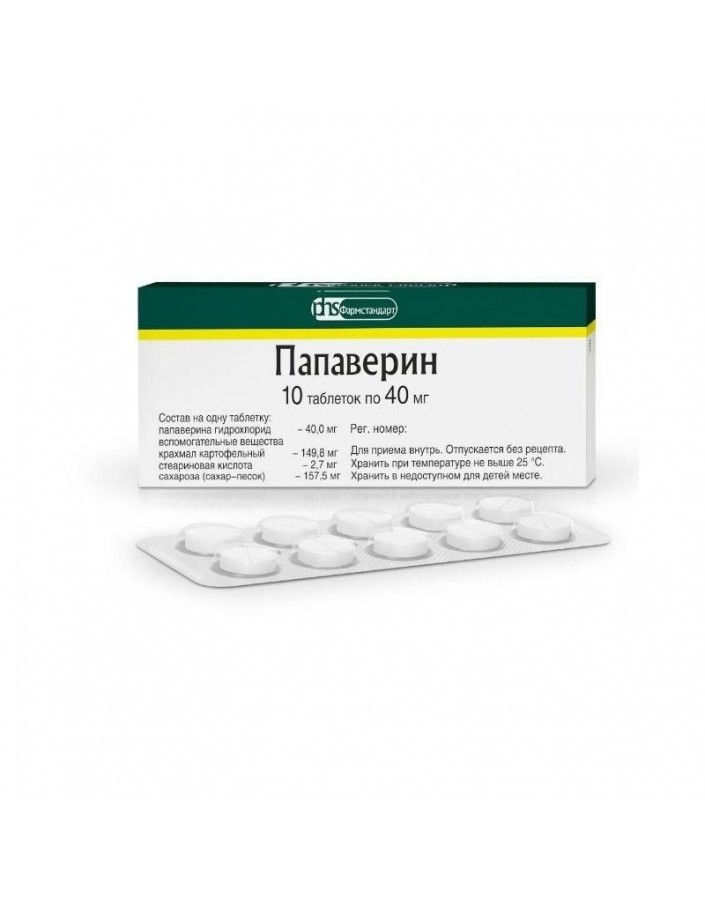




Security policy (edit with Customer reassurance module)

Delivery policy (edit with Customer reassurance module)

Return policy (edit with Customer reassurance module)
Rectal suppositories: 1 suppository contains papaverine hydrochloride 20 mg;
Excipients: solid fat, type A or vitepsol - sufficient to obtain a suppository weighing from 1.19 to 1.31 g;
in a blister strip package 5 pcs., in a carton pack 2 packs.
Solution for injection 2%:
1 mg of solution contains 20 mg of papaverine hydrochloride;
in ampoules of 2 ml, 10 ampoules in a box.
Pills: 1 pill contains 40 mg of papaverine hydrochloride;
10 pills per pack.
Myotropic antispasmodic. It has a hypotensive effect. Inhibits phosphodiesterase, causes the accumulation of cyclic 3`, 5`-AMP in the cell and a decrease in Calcium content; reduces the tone and relaxes the smooth muscles of internal organs (GIT, respiratory and urogenital system) and blood vessels. Causes dilation of arteries, contributes to increased blood flow, incl. cerebral In large doses, reduces the excitability of the heart muscle and slows intracardiac conduction. The effect on the central nervous system is mild, but in high doses it has a sedative effect.
Myotropic antispasmodic. Reduces the tone of smooth muscles of internal organs and blood vessels. Causes dilation of arteries, contributes to increased blood flow, incl. cerebralWhen used in moderate therapeutic doses, papaverine has virtually no effect on the central nervous system.
Absorption is high. Penetrates histohematogenous barriers. Excreted by the kidneys (in the form of metabolites).
Spasm of smooth muscles of the abdominal organs (cholecystitis, pylorospasm, spastic colitis, renal colic);
peripheral vasospasm (endarteritis);
spasm of cerebral vessels;
angina (as part of complex therapy);
bronchospasm.
Hypersensitivity, AV blockade, glaucoma, abnormal liver function, advanced age (risk of hyperthermia), children's age (up to 6 months).
Pills: inside for adults 40-60 mg 3-4 times a day.Children aged 6 months. up to 2 years - 5 mg, 3-4 years - 5-10 mg, 5-6 years -10 mg, 7-9 years - 10-15 mg, 10-14 years - 15-20 mg 3-4 times a day.
Solution d / injection: P / C, in / m - 1-2 ml of 2% solution (20-40 mg) 2-4 times a day; in / in, slowly 20 mg with a preliminary dilution in 10-20 ml of 0.9% sodium chloride solution.
For elderly patients initial single dose - no more than 10 mg.
Suppositories: rectally, 20-40 mg 2-3 times a day (for adults).
Allergic reactions; AV blockade, ventricular premature beats, decreased blood pressure, constipation, drowsiness, increased activity of liver transaminases, eosinophilia.
Diplopia, weakness, drowsiness.
With caution and in small doses should be used in elderly and debilitated patients, as well as in patients with traumatic brain injury, impaired liver and kidney function, hypothyroidism, adrenal insufficiency, prostatic hypertrophy, with supraventricular tachycardia and shock.
In / in should be entered slowly and under the supervision of a physician.
During pregnancy and lactation during lactation, the safety and efficacy of papaverine hydrochloride has not been established.
During the period of treatment should be excluded alcohol.
Reduces the effect of dopegita. When smoking is reduced.
Store in a dark place.
Papaverine hydrochloride